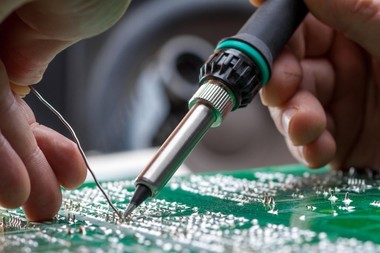☰ Menu
Menu

The IPC – formerly known as the Institute of Printed Circuits – is a trade association whose goal is to standardize the assembly and production requirements of electronic equipment by means of technical training and certification classes. This association works with many companies throughout the electronics manufacturing industry to set the standard for consistency and excellency and support its continued growth. In other words, getting your IPC soldering certification can open many doors for you to begin your burgeoning career in this industry. Read on to learn more about how to start your career with a soldering certification from EEI Manufacturing Services.
Benefits of Soldering
It is essential to create secure connections between wires to ensure that electronic equipment works as it should. After all, it only takes one tiny, missed connection to prevent an appliance from completely malfunctioning. Quality soldering serves to create serviceable joints between different pieces of metal and create a single entity, making sure that wires are securely attached and maintaining the working life of the equipment.
Completing your soldering certification is the best way to show employers that you take this career seriously and know how to work safely and correctly. Given that the IPC is the gold standard for electronics manufacturing training, many professionals and vendors within the industry all communicate using the same IPC-based terminology and prefer to hire employees who have been trained in IPC certified courses since they are better prepared to follow industry standards during production processes. Earning your soldering certification is a direct investment in the future of your career.
Why You Should Complete Soldering Training
Soldering training is the easiest way earn a head start in the job market for your new career since IPC certification is so universally recognized as a measuring tool for manufacturing readiness. Whether you are completely fresh in the industry or looking to update your skills, soldering training will help you earn the IPC-A-620 certification which will demonstrate your ability to precisely melt solder and your commitment to maintaining the highest standards.
Following a short period of study on a course, such as the IPC-A-620 or J-STD-001, you can learn all the necessary information pertaining to soldering technique and manufacturing equipment that you need to become certified for two years. Choosing a certification program recognized by the IPC is sure to show employers that you have all the necessary skills to perform their required job duties.
Practicality of Soldering Certification
Receiving training in soldering is more than simply learning how to connect point A to point B – it is also learning why the process works. Since soldering is a skill that can be applied across a vast array of circumstances, whether assembling smaller toys or affixing components on a construction site, it is possible to enhance the training with any related pre-existing skills. Not only can soldering certification kickstart your career progression with an employer, but it also sets up recipients to build or repair electronics as an independent contractor if so desired.
When looking for the highest quality soldering training, consider registering for the Basic Soldering 32 Hour Program that we offer from EEI Manufacturing Services. Our course involves a modularized curriculum that can be customized to fit the requirements of your company, with modules that include items such as component identification, through-hole soldering, localized cleaning, and so much more to ensure the highest degree of training so everyone involved can best learn how to solder. Contact us to learn more about our training programs and register today to get your career in electronic manufacturing started.